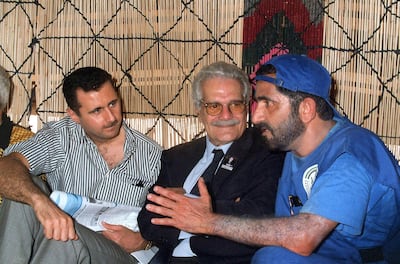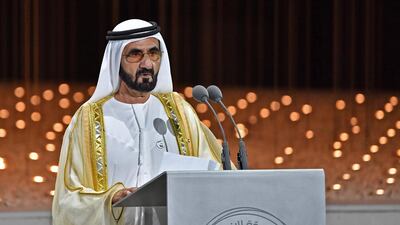The publication of Sheikh Mohammed bin Rashid’s autobiography in English brings a whole new audience to the life story of the Vice President of the UAE and Ruler Dubai.
He tells of witnessing the 1971 signing of the Union, and he tells of the moment his father, Sheikh Rashid, turned down the chance to be the first President of the UAE, insisting that Sheikh Zayed lead the newly formed nation.
Here are some of the key moments from the book:

As a young man he soon learned the value of money
When Sheikh Mohammed was just 17, he enrolled at an English language school in Cambridge, boarding with a local family.
He was given £2 as a weekly spending allowance, worth the equivalent of around Dh165 today. The young sheikh saved the money, sometimes skipping lunch, so that he could buy a train ticket to watch horse racing.
Sheikh Mohammed also recalls the kindness of his landlady, Mrs Summers, but also the strange cooking smells, which turned out to be mashed potatoes and peas.

Responsibility came early
In 1968, at the age of 19, he was given the task of setting up a defence force for Dubai by his father. The country had just three years before British forces would leave the country for good.
In 1973, Sheikh Mohammed found himself negotiating with terrorists when a hijacked Japanese airliner landed in Dubai. He refused to meet their demands.
The previous year, he had ensured the swift end to a coup in neighbouring Sharjah without exacerbating the bloodshed.

Not all his role models were powerful
The young sheikh learned desert skills as a youth from a man named Humaid bin Amh.
He would suffer from scorpion bites on desert trips, later discovering his mentor had deliberately put baby scorpions in his bedding because their milder venom would provide immunity from adult stings.
“Not everything that hurts you is evil. Sometimes, it’s for your own good and protection,” Sheikh Mohammed writes.
Another man who made an impression was Abu Jaber, a pearl diver. “There are lessons I gathered being with pearl divers – a leader has to have an eye of a bird, view things from above so he can understand it objectively,” he reflects.

His love of horses goes back to his childhood
When Sheikh Mohammed was only 10, he would help bring an injured horse back to full health. Such was his commitment, that the boy sometimes even slept in the stable overnight.
It was an episode that taught him an important lesson, he writes. “I learnt that when you give something good to a horse, they will give back double. My horse taught me about loyalty.”

He tried to persuade Saddam Hussein to accept exile in Dubai
On the eve of the second Gulf War in 2003, Sheikh Mohammed met with Saddam Hussein to persuade him to voluntarily step down as leader of Iraq.
He found the dictator paranoid about assassins and apparently unaware of the potential scale of the disaster about to unfold.
After a conversation that lasted five hours and saw the dictator leave the room five times, Saddam eventually turned down the offer of exile in the UAE.
The Ruler writes that the dictator said: ‘But Sheikh Mohammed, I am speaking about saving Iraq, not myself.’ I held him in much higher regard after he said this.”

Dictators sought his advice in recreating Dubai
Both Bashar Al Assad of Syria and Libya’s Muammar Qaddafi came to Sheikh Mohammad asking how Dubai’s successful economic model could help their own countries.
On one visit to Dubai, Al Assad was driven around the city by Sheikh Mohammed, with the two men eventually strolling around a Dubai department store deep in conversation.
Of Qaddafi, Sheikh Mohammed writes: “I remember how he once called me to tell me that he wanted to build a new Dubai in Libya and for it to act as the economic capital of Africa.”
The reality, Sheikh Mohammed says, is that neither man understood the scale of the task ahead. “There’s a huge difference between what you wish for and what you do to fulfil your wishes and dreams. Wishes and reality are widely spread apart,” he writes.


